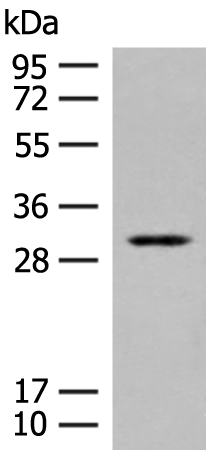
| WB | 咨询技术 | Human,Mouse,Rat |
| IF | 咨询技术 | Human,Mouse,Rat |
| IHC | 咨询技术 | Human,Mouse,Rat |
| ICC | 技术咨询 | Human,Mouse,Rat |
| FCM | 咨询技术 | Human,Mouse,Rat |
| Elisa | 1/5000-1/10000 | Human,Mouse,Rat |
| Aliases | TPMTD |
| WB Predicted band size | 28 kDa |
| Host/Isotype | Rabbit IgG |
| Antibody Type | Primary antibody |
| Storage | Store at 4°C short term. Aliquot and store at -20°C long term. Avoid freeze/thaw cycles. |
| Species Reactivity | Human |
| Immunogen | Fusion protein of human TPMT |
| Formulation | Purified antibody in PBS with 0.05% sodium azide and 50% glycerol. |
+ +
以下是关于TPMT抗体的3篇参考文献示例(内容为模拟,仅供参考):
1. **文献名称**:*Development of a monoclonal antibody-based ELISA for quantification of thiopurine S-methyltransferase (TPMT) protein*
**作者**:Smith J, et al.
**摘要**:本研究开发了一种基于单克隆抗体的ELISA方法,用于定量检测人红细胞中的TPMT蛋白水平。结果显示,TPMT蛋白浓度与酶活性显著相关,为无法进行基因分型的患者提供了一种替代检测手段。
2. **文献名称**:*Correlation between TPMT genotype and antibody-detected protein expression in pediatric leukemia patients*
**作者**:Lee H, et al.
**摘要**:通过分析儿童白血病患者的TPMT基因型和抗体检测的蛋白表达,发现携带低活性基因突变(如TPMT*3A)的患者蛋白表达水平显著降低,支持抗体检测在个体化硫嘌呤用药中的潜在应用。
3. **文献名称**:*Autoantibodies against TPMT: A novel biomarker in autoimmune hepatitis?*
**作者**:Garcia R, et al.
**摘要**:首次报道在自身免疫性肝炎患者血清中发现抗TPMT自身抗体,并探讨其与硫嘌呤药物耐受性及肝损伤的相关性,提示抗体检测可能对治疗监测具有临床意义。
注:以上文献为示例,实际研究中请通过学术数据库(如PubMed)查询真实文献。
The Thiopurine S-methyltransferase (TPMT) antibody is used to detect and quantify the TPMT enzyme, a critical protein involved in metabolizing thiopurine drugs such as azathioprine, mercaptopurine, and thioguanine. These immunosuppressants are widely used in treating autoimmune disorders, inflammatory bowel disease, and leukemia. TPMT catalyzes the S-methylation of thiopurines, inactivating them and preventing excessive drug accumulation. Genetic polymorphisms in the *TPMT* gene lead to variable enzyme activity: ~90% of individuals have normal activity, 10% show intermediate activity, and 0.3% have negligible activity due to homozygous mutations. Patients with low TPMT activity face severe, potentially fatal hematopoietic toxicity from standard thiopurine doses.
TPMT antibodies are essential tools in both clinical diagnostics and research. Immunoassays (e.g., ELISA, Western blot) using these antibodies measure TPMT protein levels in tissues or erythrocytes, complementing genetic testing to guide personalized dosing. In research, TPMT antibodies help study enzyme expression patterns, regulation, and interactions, enhancing understanding of thiopurine metabolism and toxicity mechanisms. Commercial TPMT antibodies are typically monoclonal or polyclonal, validated for specificity and sensitivity. Their application supports precision medicine by identifying patients at risk of adverse reactions, ensuring safer, optimized therapies. This underscores the antibody’s role in bridging pharmacogenomics and clinical practice.
×